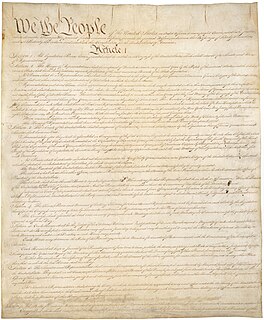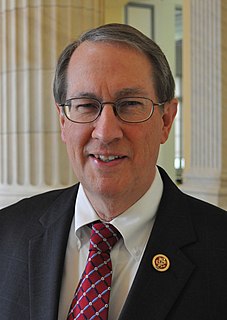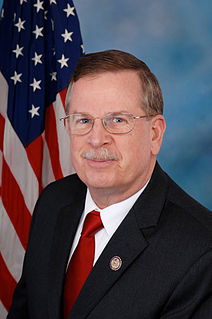Related Research Articles

The Constitution of the United States is the supreme law of the United States of America. It superseded the Articles of Confederation, the nation's first constitution. Originally comprising seven articles, it delineates the national frame of government. Its first three articles embody the doctrine of the separation of powers, whereby the federal government is divided into three branches: the legislative, consisting of the bicameral Congress ; the executive, consisting of the president and subordinate officers ; and the judicial, consisting of the Supreme Court and other federal courts. Article IV, Article V, and Article VI embody concepts of federalism, describing the rights and responsibilities of state governments, the states in relationship to the federal government, and the shared process of constitutional amendment. Article VII establishes the procedure subsequently used by the 13 States to ratify it. It is regarded as the oldest written and codified national constitution in force.

Article Five of the United States Constitution describes the process for altering the Constitution. Under Article Five, the process to alter the Constitution consists of proposing an amendment or amendments, and subsequent ratification.
Campaign finance laws in the United States have been a contentious political issue since the early days of the union. The Bipartisan Campaign Reform Act (BCRA) of 2002, also known as "McCain-Feingold", is the most recent major federal law affecting campaign finance, the key provisions of which prohibited unregulated contributions to national political parties and limited the use of corporate and union money to fund ads discussing political issues within 60 days of a general election or 30 days of a primary election, until BCRA's provisions limiting corporate and union expenditures for issue advertising were overturned in Federal Election Commission v. Wisconsin Right to Life.
In United States government, the line-item veto, or partial veto, is the power of an executive authority to nullify or cancel specific provisions of a bill, usually a budget appropriations bill, without vetoing the entire legislative package. The line-item vetoes are usually subject to the possibility of legislative override as are traditional vetoes.
A constitutional amendment is a modification of the constitution of a polity, organization or other type of entity. Amendments are often interwoven into the relevant sections of an existing constitution, directly altering the text. Conversely, they can be appended to the constitution as supplemental additions, thus changing the frame of government without altering the existing text of the document.

Randy Evan Barnett is an American legal scholar and lawyer. He serves as the Patrick Hotung Professor of Constitutional Law at Georgetown University, where he teaches constitutional law and contracts, and is the director of the Georgetown Center for the Constitution. After graduating from Northwestern University and Harvard Law School, he tried many felony cases as a prosecutor in the Cook County States’ Attorney's Office in Chicago. A recipient of a Guggenheim Fellowship in Constitutional Studies and the Bradley Prize, Barnett has been a visiting professor at Penn, Northwestern and Harvard Law School.

Robert William Goodlatte is an American politician, attorney, and lobbyist who served in the United States House of Representatives representing Virginia's 6th congressional district for 13 terms. A Republican, he was also the Chair of the House Judiciary Committee, which has jurisdiction over legislation affecting the federal courts, administrative agencies, and federal law enforcement entities. Goodlatte's district covered Roanoke and also included Lynchburg, Harrisonburg, and Staunton.
In legislative procedure, a rider is an additional provision added to a bill or other measure under the consideration by a legislature, having little connection with the subject matter of the bill.
A balanced budget amendment is a constitutional rule requiring that a state cannot spend more than its income. It requires a balance between the projected receipts and expenditures of the government.
Budget reconciliation is a special parliamentary procedure of the United States Congress set up to expedite the passage of certain budgetary legislation in the United States Senate. The procedure overrides the filibuster rules in the Senate, which may otherwise require a 60-vote supermajority for the passage by the Senate. Bills described as reconciliation bills can pass the Senate by a simple majority of 51 votes or 50 votes plus the Vice President's as the tie-breaker. The reconciliation procedure also applies to the House of Representatives, but it has minor significance there, as the House does not have a supermajority requirement. Due to greater polarization, gridlock and filibustering in the Senate in recent years, budget reconciliation has come to play an important role in how the U.S. Congress legislates.

The Constitution of the State of Texas is the document that establishes the structure and function of the government of the U.S. state of Texas, and enumerates the basic rights of the citizens of Texas.

Voting rights of citizens in the District of Columbia differ from the rights of citizens in each of the 50 U.S. states. The Constitution grants each state voting representation in both houses of the United States Congress. As the federal capital, the District of Columbia is a special federal district, not a state, and therefore does not have voting representation in Congress. The Constitution grants Congress exclusive jurisdiction over the District in "all cases whatsoever".
The Constitution of Arkansas is the primary organizing law for the U.S. state of Arkansas delineating the duties, powers, structures, and functions of the state government. Arkansas' original constitution was adopted at a constitutional convention held at Little Rock in advance of the territory's admission to the Union in 1836. The current constitution was ratified in 1874 following the Brooks–Baxter War.
A convention to propose amendments to the United States Constitution, also referred to as an Article V Convention or amendatory convention; is one of two methods authorized by Article Five of the United States Constitution whereby amendments to the United States Constitution may be proposed: two thirds of the State legislatures may call a convention to propose amendments, which become law only after ratification by three-fourths of the states. The Article V convention method has never been used; but 33 amendments have been proposed by the other method, a two-thirds vote in both houses of Congress; and 27 of these have been ratified by three-fourths of the States. Although there has never been a federal constitutional convention since the original one, at the state level more than 230 constitutional conventions have assembled in the United States.
The enumerated powers of the United States Congress are the powers granted to the federal government of the United States by the United States Constitution. Most of these powers are listed in Article I, Section 8.

The Constitution of the State of Colorado is the foundation of the laws and government of the U.S. state of Colorado. The current, and only, Colorado State Constitution was drafted on March 14, 1876; approved by Colorado voters on July 1, 1876; and took effect upon the statehood of Colorado on August 1, 1876. As of 2020, the constitution has been amended at least 166 times. The Constitution of Colorado derives its authority from the sovereignty of the people. As such, the people of Colorado reserved specific powers in governing Colorado directly; in addition to providing for voting for Governor, state legislators, and judges, the people of Colorado have reserved initiative of laws and referendum of laws enacted by the legislature to themselves, provided for recall of office holders, and limit tax increases beyond set amounts without explicit voter approval, and must explicitly approve any change to the constitution, often with a 55% majority. The Colorado state constitution is one of the longest in the United States.

The history of the USA PATRIOT Act involved many parties who opposed and supported the legislation, which was proposed, enacted and signed into law 45 days after the September 11 terrorist attacks in 2001. The USA PATRIOT Act, though approved by large majorities in the U.S. Senate and House of Representative, was controversial, and parts of the law were invalidated or modified by successful legal challenges over constitutional infringements to civil liberties. The Act had several sunset provisions, most reauthorized by the USA PATRIOT Improvement and Reauthorization Act of 2005 and the USA PATRIOT Act Additional Reauthorizing Amendments Act. Both reauthorizations incorporated amendments to the original USA PATRIOT Act, and other federal laws.

Richard B. "Rich" Nugent is an American retired law enforcement officer and former United States Congressman. He is a member of the Republican Party. He is a former Sheriff of Hernando County, Florida. On November 2, 2010, Richard Nugent defeated Democratic nominee James Piccillo, to replace retiring Congresswoman Ginny Brown-Waite. Nugent was a member of the Tea Party Caucus. On November 2, 2015, Nugent announced he would not seek reelection.
References
- 1 2 3 4 Neale, Thomas H. (2016-03-29). "The Article V Convention to Propose Constitutional Amendments: Current Developments" (PDF). Congressional Research Service. p. 9. Retrieved 2016-07-29.
- 1 2 3 Reynolds, Glenn Harlan (2016-02-01). "Want to know why voters are so mad? Mia Love has the answer". USA Today . Retrieved 2016-07-29.
- ↑ Joshpe, Brett (2014-10-24). "How about a federal single subject rule?". Washington Examiner . Retrieved 2016-07-29.
- ↑ Hinman, Machael (2014-05-01). "Florida first state to demand a single-subject Constitutional convention". The Laker/Lutz News. Retrieved 2016-07-29.
- ↑ Leef, George (2016-01-29). "Crimp Wasteful Federal Spending With This Constitutional Amendment". Forbes. Retrieved 2016-07-29.